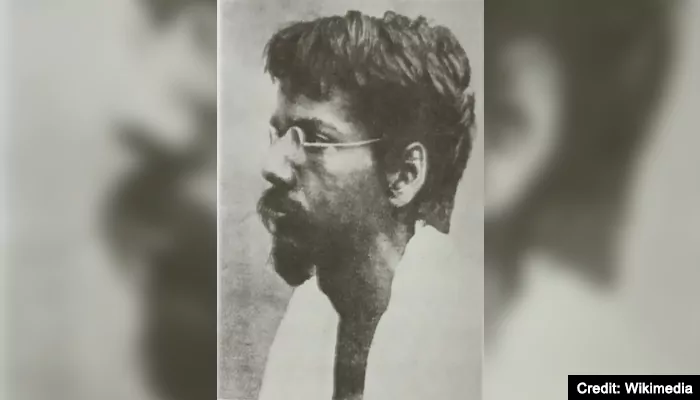
While Sri Aurobindo took to silence and spiritualism, his brother Barin chose dynamite, conspiracy—and twelve brutal years in exile
In India's history of independence, the focus has traditionally been on prominent figures like Gandhi, Nehru, and Aurobindo Ghosh. However, behind the illustrious Sri Aurobindo stood another Ghosh—his younger brother Barindra Kumar Ghosh—who exchanged privilege for prison and ideals for action. His story is not merely forgotten; it is almost wiped from the collective memory of the nation.
Born in 1880 in London to a progressive Bengali family, Barin was raised amid political unrest and philosophical debates. But where Aurobindo turned inward, embracing asceticism and silence, Barin chose the path of fire—engaging in armed rebellion, bomb-making, and harbouring a fierce vision for India's freedom.

(Credit: UPSC with Nikhil)
Educated at Deoghar and Patna College, Barin's transformation started under his brother's influence. Aurobindo introduced him to secret societies, such as Mitra Mela and Abhinav Bharat, where he received basic military training.
Barin returned to Calcutta and quickly helped establish the Jugantar group—a covert revolutionary cell that combined political journalism with paramilitary tactics. The group's newspaper became the voice for militant nationalism, advocating outright rebellion.
In 1908, Jugantar organised a plot to assassinate magistrate D.H. Kingsford—a symbol of colonial cruelty. Two young men, Khudiram Bose and Prafulla Chaki, threw bombs at what they believed was Kingsford's carriage. They were mistaken. Two British women were killed. Prafulla took his own life. Khudiram was hanged.
Barin and Sri Aurobindo were arrested, along with more than 30 others. The Alipore Bomb Case became the British Raj's first major sedition trial. The prosecution presented over 1,400 exhibits, 200 witnesses, and treated the accused with chilling inhumanity—solitary confinement, starvation, and systemic abuse. Aurobindo was acquitted. Barin was sentenced to death, later commuted to life imprisonment in the Cellular Jail of the Andamans.

(Credit: Civil Aspirant )
Barin spent 12 torturous years in the penal hell of Kalapani. His memoir, The Tale of My Exile, is one of the most harrowing first-person accounts of political imprisonment in colonial India. He describes his memory becoming "moribund," his brain "drunken" with pain, and the grotesque conditions where men twisted coir and ground oil until their fingers bled.
Humiliated, chained, and dehumanised, Barin watched his comrades deteriorate. Many went mad. Some chose suicide. Few endured. As Barin wrote:
"Only those whose hearts turned to stone could bury their pain and count their days in the hope of a future."
Barin was released in 1920 under a general amnesty following the end of World War I. India was now influenced by Gandhi's nonviolent movement, and the era of bombs had waned. Barin ventured into journalism, founding The Dawn of India and later editing Basumati. He briefly reunited with his brother at the Pondicherry Ashram, where he explored the spiritual path but never fully forsook his belief in direct action.
Throughout the years, he authored over 20 books and essays, demonstrating a mind as restless in thought as it once was in rebellion. His life, however, ended quietly in 1959, a stark contrast to the fiery fury of his youth.

(Credit: SAIC)
Barindra Kumar Ghosh was no mere footnote in India's independence. He was its early thunderclap—raw, flawed, and fiercely idealistic. His name deserves more than a fleeting mention alongside his more famous brother. It belongs among the architects of India's revolt—not just for what he did, but for what he endured.
In forgetting Barin, we overlook a vital chapter of India's uprising—the part that came not with chants and spinning wheels but with whispers in the dark, blueprints for bombs, and blood on colonial soil.